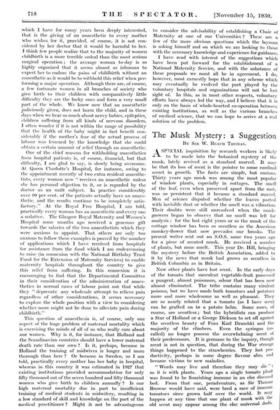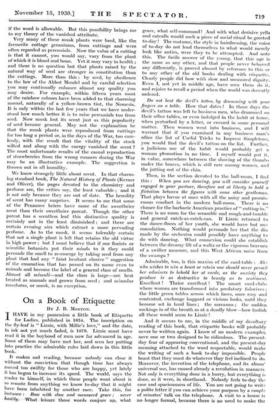The Musk Mystery: a Suggestion By Sin W. BEACH THOMAS.
ASPECIAL inquisition by research workers is likely to be made into the botanical mystery of the musk, lately revived as a standard marvel. It may be that its loss of scent is the pointer to some cardinal secret in growth. The facts are simple, but curious. Thirty years ago musk was among the most popular of window plants, especially in cottages. The smell of the leaf, even when preserved apart from the root, was so persistent that it became a standard marvel. Men of science disputed whether the leaves parted with invisible dust or whether the smell was a vibration. Their doubts were still unresolved when the musk- growers began to observe that no smell was left for analysis : for the last eight years or so the musk of the cottage window has been as scentless as the American monkey-flower that now pervades our brooks. The present writer sent out an S.O.S. some two years ago for a piece of scented musk. He received a number of plants, but none smelt. This year Dr. Hill, bringing the mystery before the British Association, added to it by the news that musk had grown as scentless in British Columbia as in Britain.
Now other plants have lost scent. In the early days of the tomato that succulent vegetable-fruit possessed a pungent. almost poisonous, odour that has been now almost eliminated. The tribe contains many virulent poisons, but we have made both tomatoes and potatoes more and more wholesome as well as pleasant. They are so nearly related that a tomato (as I have seen) can be grafted on to a potato helm. Some roses, of course, are scentless ; but the hybridists can produce a Star of Holland or a George Dickson to set off against the scentless beauty of Frau Karl Druschki and the majority of the climbers. Even the syringas (so- called) no longer possess the overwhelming scent of their predecessors. It is germane to the inquiry, though scent is not in question, that during the War strange things happened to the strawberries. They lost pro- ductivity, perhaps in some degree flavour also, and became victims to new maladies.
" Words may live and therefore they may die " : so it is with plants. Years ago a single tomato plant was found to be flourishing immune in an else diseased bed. From that one, peradventure, as Sir Thomas Browne would have said, were bred a race of immune
tomatoes since grown half over the world. It may happen at any time that one plant of musk with the old scent may appear among the else universal, duds,
if the word is allowable. But this possibility brings me to my theory of the vanished attribute.
Very many of these musk plants were bred, like the favourite cottage geraniums, from cuttings and were often regarded as perennials. Now the value of a cutting is that it cannot, you would say, vary from the plant of which it is blood and bone. Yet it may vary in health ; and. there is no question but that plants raised by the natural way of seed are stronger in constitution than the cuttings. - More than this: by seed, by obedience
to the law of the Abbot Mendel and by careful selection . , . you may continually enhance almost any quality you may desire. For example, within fifteen years most of the rainbow colours have been added to that charming annual, naturally of a yellow-brown tint, the Nemesia. It is only within the last feW years that we have under- stood how much better it is to raise perennials too from seed. Now musk lost its scent just as this popularity of seed became general. May not the explanation be that the musk plants were reproduced from cuttings for too long a period or, in the days of the War, too care- lessly, with the result that the vitality of the stock wilted and along with the energy vanished the scent ? The most unfortunate results of the casual reproduction of strawberries from the wrong runners during the War may be an illustrative example. The suggestion is thrown out in all humility.
We know strangely little about scent. In that charm- ing standard book, The Natural History of Plants (Kerner and Oliver), the pages devoted to the chemistry and perfume are, the critics say, the least valuable ; and it is not only because they are out of date. The heredity of scent has many surprises. It seems to me that some of the Penzance briers have more of the sweetbrier scent than their sweetbrier parent. Though the other parent has a scentless leaf this distinctive quality is certainly not in the least diminished ; and there are certain evening airs which extract a more pervading perfume. As to the musk, it seems tolerably certain that not a single plant is left that retains the old virtue in high power ; but I must believe that if our florists or scientific botanists put their minds to it they could persuade the smell to re-emerge by taking seed from any plant that had any " faint hesitant elusive " suggestion of the emanation that has passed on its name even to animals and become the label of a general class of smells. Almost all mimuli—and the class is large—arc best treated as annuals and grown from seed ; and mimulus moschatus, or musk, is no exception.









































 Previous page
Previous page